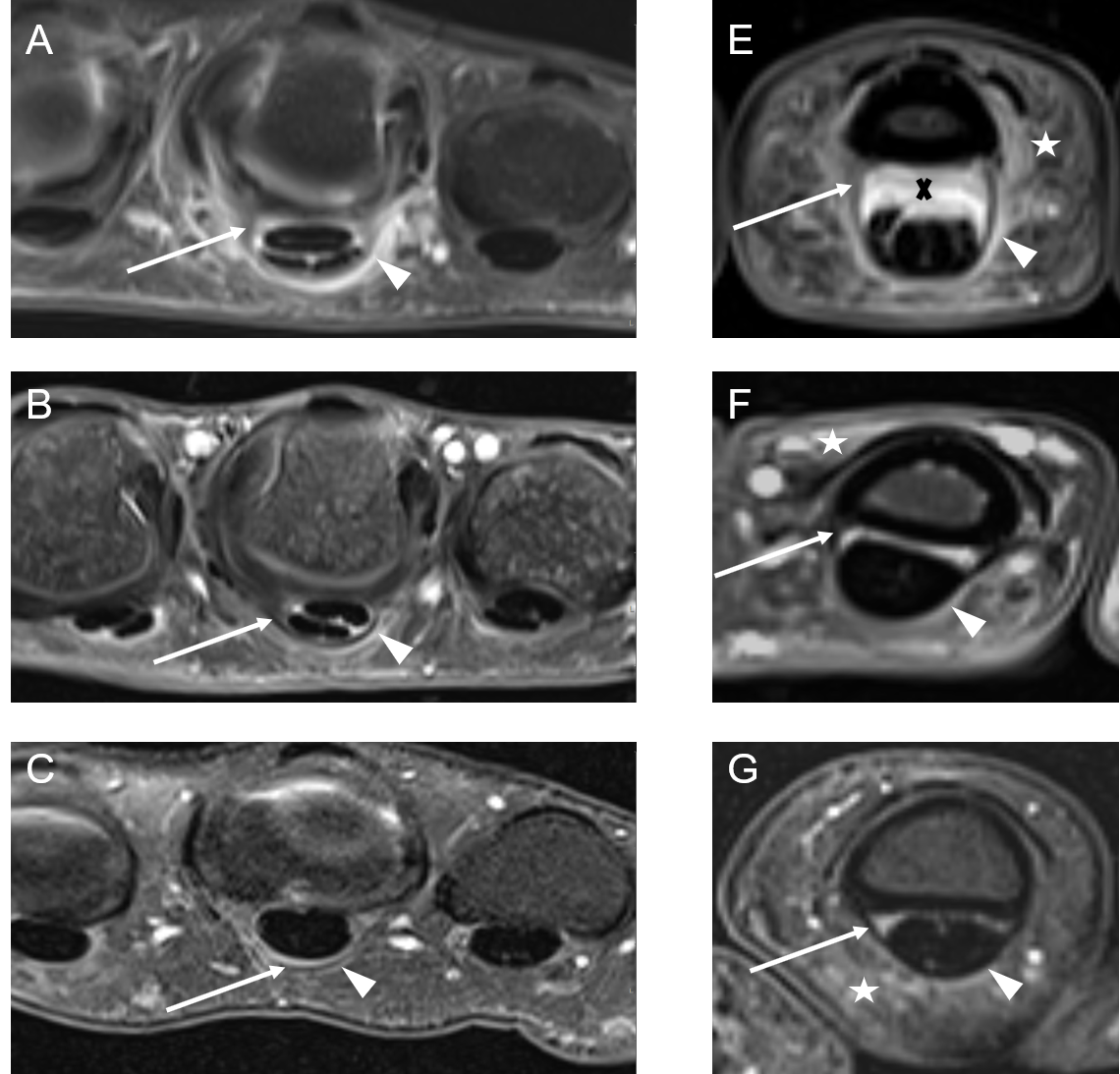Session Information
Session Type: ACR Abstract Session
Session Time: 4:30PM-6:00PM
Background/Purpose: To evaluate the value of 3 Tesla (T) magnetic resonance imaging (MRI) changes of flexor tendon pulleys for the differentiation of psoriatic (PsA) and rheumatoid arthritis (RA), as well as for potential disease detection and monitoring.
Methods: A total of 17 patients with active PsA, 20 patients with active RA and 16 healthy controls (HC) were evaluated by high-resolution 3T MRI using a dedicated 16-channel hand coil. Images were analyzed by three independent readers for the degree of inflammatory changes, the thickness of flexor tendon pulleys and comparison to the outcome measures for RA clinical trials (OMERACT) PsA MRI score (PsAMRIS) and to its sub-scores: synovitis, flexor tenosynovitis, bone edema, bone erosion, periarticular inflammation and bone proliferation.
Results: Flexor tendon pulleys were thicker in PsA than in RA patients (mean difference 0.16 mm, p< 0.001) and HC (mean difference 0.2 mm, p< 0.001) and showed a higher degree of associated inflammatory changes (mean difference RA: 4.7, p=0.048; mean difference HC: 14.65, p< 0.001). Additionally, there was a strong correlation of pulley inflammation and total PsAMRIS and its acute-inflammatory sub-scores, flexor tenosynovitis, synovitis and periarticular inflammation (digitus (D) 2: synovitis r=0.72, flexor tenosynovitis 0.7, overall PsAMRIS r=0.72; D3: flexor tenosynovitis r=0.91, periarticular inflammation 0.62, overall PsAMRIS r=0.81; D4: flexor tenosynovitis r=0.7, periarticular inflammation r=0.77; D5: synovitis r=0.83, flexor tenosynovitis 0.76, periarticular inflammation r=0.6, overall PsAMRIS r=0.8. p< 0.05).
Conclusion: The assessment of MRI changes of flexor tendon pulleys is potentially beneficial for disease detection and monitoring in PsA, as well as for its distinction from RA and HC.
To cite this abstract in AMA style:
Sewerin P, Abrar D, McGonagle D, Frenken M, Ratke K, Vordenbaeumen S, Brinks R, Schneider M, Ostendorf B, Schleich C. High-resolution MRI Assessment of Flexor Tendon Pulleys in Psoriatic Arthritis for Disease Monitoring and Differentiation from Rheumatoid Arthritis Using a 16-channel Hand Coil [abstract]. Arthritis Rheumatol. 2019; 71 (suppl 10). https://acrabstracts.org/abstract/high-resolution-mri-assessment-of-flexor-tendon-pulleys-in-psoriatic-arthritis-for-disease-monitoring-and-differentiation-from-rheumatoid-arthritis-using-a-16-channel-hand-coil/. Accessed .« Back to 2019 ACR/ARP Annual Meeting
ACR Meeting Abstracts - https://acrabstracts.org/abstract/high-resolution-mri-assessment-of-flexor-tendon-pulleys-in-psoriatic-arthritis-for-disease-monitoring-and-differentiation-from-rheumatoid-arthritis-using-a-16-channel-hand-coil/

